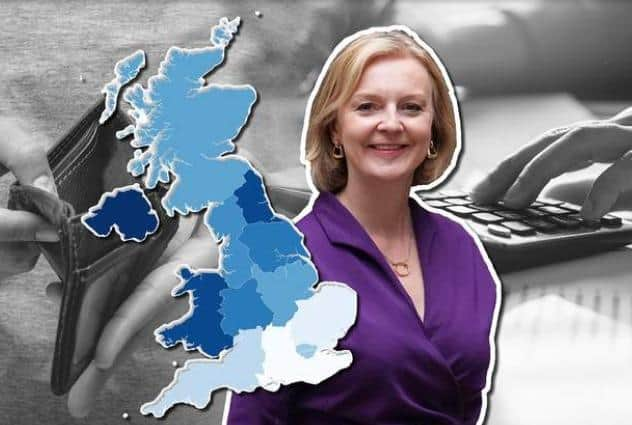Cost of living tax cuts Sheffield: Millions in Yorkshire would miss out under Liz Truss plan
and live on Freeview channel 276
Almost two million people in the Yorkshire and the Humber region who do not earn enough to pay income tax could be left behind if new Prime Minister Liz Truss pushes ahead with plans to prioritise tax cuts to tackle the cost of living crisis.
Women and people in the region are among the groups where the most people are set to miss out on a potential income tax cut.


Advertisement
Hide AdAdvertisement
Hide AdWhile Ms Truss did say she would announce "emergency" support "within a week" in an interview with the BBC’s Laura Kuenssberg on Sunday (4 September), it remains to be seen what kind of support this will be.
The new prime minister said consistently throughout the Conservative leadership contest that she favours reducing tax burdens to support people with rising energy and other costs, including by reversing the recent increase to National Insurance.
She is reportedly also considering cutting income tax, possibly by raising the personal allowance, so people can earn more before they start paying tax.
But analysis by NationalWorld, the company which owns The Star, shows more than 1,834,428 people across Yorkshire are already expected to pay no income tax this financial year, either because they have no income, earn less than the current £12,570 personal allowance, or their deductions and tax reliefs put them below the income tax threshold.
Advertisement
Hide AdAdvertisement
Hide AdHMRC data shows 2.64 million people in the Yorkshire are projected to pay income tax in 2022/23. That is 59 per cent of the estimated 4,474,428 million people aged 16 and over, according to Office for National Statistics (ONS) population figures for mid 2020 – meaning 41% of adults will not pay tax.
Official Government figures Sheffield has 388,400 in that age group, of which 68,000 are not economically inactive, for reasons including retirement or education or looking after a home, and 14,800 who are claiming out of work benefits. It is not known how many earn below the tax threshold.
Neither raising the personal allowance, nor cutting income tax rates, would provide any additional support for this group.
Only Northern Ireland and the North East are home to a biggest proportion of non-income taxpayers, at 44% and 43% respectively. That compares to only 33% in the South East and 34% in the East of England.
The Institute of Public Policy Research North (IPPR North) said tax cuts are “an incredibly inefficient way of getting money to those who need it most”.
IPPR North senior research fellow, Jonathan Webb, said the new Prime Minister must instead focus on long-term solutions to the cost of living crisis.
“This means giving more targeted support to those on the lowest incomes and taking specific action on the energy crisis – for example, by committing to retrofit the country’s poor quality homes,” he said.
Advertisement
Hide AdAdvertisement
Hide AdAlmost half of women (47%) do not earn enough to pay income tax, our analysis shows, compared to fewer than two-fifths of men (28%). That would mean 13 million women would see no difference to their income from tax cuts – almost two-thirds of the 20 million total.
Dr Mary-Ann Stephenson, director of the Women’s Budget Group, a non-profit that monitors the impact of government policy on men and women, said the figures were “not surprising” , adding her organisation’s own analysis showed cuts to National Insurance would similarly benefit men over women.
While many women may live in households with an income taxpayer who would benefit from a tax cut, Dr Stephenson said this did not mean women would share equally in the profits of such a policy.
“Obviously you can’t pretend that there’s no relationship financially between people in households, but we also know that money isn’t shared equally within households,” she said.
“We know that in particular if you’re looking at support for children, money paid to mothers is more likely to be spent on children than money paid to fathers.
“We know that very many women live in relationships that are violent or in other ways abusive, which can include financial abuse, which can include cutting access to family resources.
“In that sense it doesn’t help.”
She called on Liz Truss to instead provide financial support through the social security system, such as Universal Credit or Child Tax Credit payments.
Gender equality charity the Fawcett Society said the cost of living crisis is disproportionately affecting women, and called on the new Prime Minister to “urgently put in place a meaningful plan” that will deliver support swiftly.
“We need deeds not words,” the charity said, as it urged Ms Truss to focus on policies that would tackle “deep-seated inequalities that hold back and harm women”.
Number 10 and the Cabinet Office were approached for comment.

